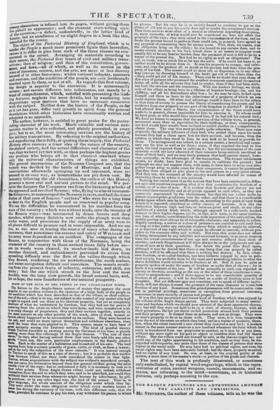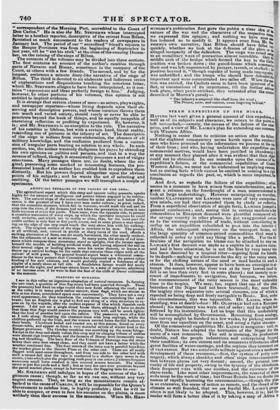Mr. STEPHENS, the author of then volumes, tells us he
was the
"correspondent of the Morning Post, accredited to the Court of Don Carlos." He is also the Mr. STEPHENS whose intercepted letter to a brother reporter, descriptive of the retreat from Bilboa, furnished so much amusement to the readers of newspapers in January last. 'The period of our " accredited" friend's sojourn in the Basque Provinces was from the beginning of September in last year, till be "cut his stick'' at the close of the ensuing Decem- ber, on the raising of the siege of Bilboa.
The contents of the volumes may be divided into three sections. The first contains an account of the author's rambles through parts of Navarre and Biscay, sometimes in the company of the Court, at others with a few friends. The second, and by fur the longest, embraces a minute diary-like narrative of the siege of Bilboa. The third is devoted to an elaborate and ludicrous series of explanations and disquisitions touching the notorious letter, which Mr. STEPHENS alleges to have been interpolated, as it con- tains "expressions and ideas perfectly foreign to him." Judging, however, by other portions of his volumes, this opinion is not entitled to implicit evidence.
It is strange that certain classes of men—as actors, playwrights, and newspaper reporters—whose living depends upon their ob- serving and descriptive powers, and whose vocation throws them into much and varied society, should rarely or never be able to penetrate beyond the husk of things, and be equally incapable of exercising reflection or profiting by experience. So, however, it is ; and Mr. STEPHENS is no exception to the rule. The narrative of his rambles is lifeless, but with a certain hard, literal reality, reminding one of pictures in the infancy of art. The description of the siege is tedious from over-elaboration, the absence of all military knowledge, and the confusion produced from a succes- sion of irregular parts bearing no relation to any whole. In each section, too, the author wantonly disfigures his pages by obtruding his own opinions on politics and persons, and that in a way the reverse of refined, though it occasionally possesses a sort of vulgar sunniness. Many passages there are, no doubt, where the ori- ginal, possessing some marked or interesting features, the pro- fesssional knack of the author has enabled him to reproduce them distinctly. But his powers depend altogether upon the obvious points of his subjects ; and he wants the art of selecting and omitting. Of the better passages we will transplant a couple of specimens.
ARTIFICIAL TERRACES OF THE VALLEY OF THE DEBA.
The agricultural aspect which this steep and narrow valley presents, speaks 'highly for the amount of intelligence and patient labour engaged in its cultiva- tion. The natural slope of the entire surface for miles above and below Pla- centia is the greatest of any I have ever seen under culture; so great, indeed, that the mountain showers, which fall in torrents,.would wash the soil and its crop into the river, if the farmers had not taken the precaution to throw it into little terraces at every few yards. These seen), from the opposite side, to present a countless succession of wavy steps, up which the spectator imagines he could walk seriatim, and which are in reality so close, that, for the most part the arable surface is only four or five yards across, and in some places a man stand- ing on the edge of one step could touch the next above him with his walking- 'tick. The original surface of the elope is nowhere to be seen. The present is all attificial, and, viewed in profile at sharp turns of the road, affords a striking alternation of faces, one set nearly horizontal, the other nearly vertical, like the silhouette of a saw or staircase. In many parts, the strata of red iron- stone which compose these mountains stand so upright, that the farmer spares himself the trouble of building artificial walls, and having adjusted the soil on their several edges or landing. places, sows his maize thereon, or leaves it to throw up a natural betbage for the cattle that traverse these ridges with all the nalvet.: of wild goats. The general frontal aspect bears a whimsical resem- blance to the wavy pattern that Constable-has impressed upon the patent calico binding of his new editions, and would probably remind a fisherman of the ripples of a sandy shore at full ebb. A Southdown farmer would feel sorely puzzled at the sight, and perhaps return home in a state of surprise, admitting of no increase even if he were to find the face of the cliffs of Dover cultivated
to the summit.
FEATURES OF DURANGO.
I saw in this valley an ingenious adaptation of natural resources. Its forming the new road, a quantity of thin flag strata had been quarried through. These the peasantry had fixed on edge round their new fields adjoining the road ; and as the valley is in many pares rather narrow, these flags, which are almost as thin as ton slates, economized space most conveniently. They have not a very rural appearance, for they transform the enclosures into something like card- boxes ; but an English eye is glad to find any thing of a slaty structure to re- pose on by the wayside, after the endless expanse of tiles which Spanish roofs present. I did not see a single slated house there, although I have no doubt that those thin flags would answer the purpose very well, and be much lighter than the load of pantiles laid upon the rafters. The peasantry were all a- field as I rode along, thrashing the chestnut-trees with long saplings, while the children gathered up the fruit, and the women carried home the full baskets on their heads. Chestnuts boiled and roasted are, at this season, found on every dinner-table, and appear to form a very material article of winter food in the Basque provinces. The October sunshine was scorching up the maize foliage. Except in the deep and shady vallies this crop and its clinging tribute of alubias were almost ripe everywhere, and the farmers of Biscay were incessantly reap. sag and thrashing. f he barn, floor of the Urbanos of Durango was the street belore their own door swept clean, and they could not have a better while the weather continued fine. The four streets of the town run in parallel lines from the marketplace to the Barrier Plaza at the other end. These are all neatly flagged with sand-stone throughout, and from one side to the other laid with such a strand-fall that the rain is conducted to a shallow open sewer in the centre, ( into which also the projecting roofs pour it con amore,) whence frequent numerous small holes conduct it into covered sewers beneath. The widest street is just five yards and a half ; but as very few cars ever penetrate beyond the paved market-place, except in harvest.time, the flagging lasts for ever. Mr. STEPHENS still indulges in hopes of the success of the Le- gitimate cause ; though, so far as we can see, without any very cogent reasons. That, as long as the mountaineers remain at- tached to the cause of CARLOS, it will be impossible for the Queen's Government to subdue him, is highly probable; that he will be able to conquer, or even to face his enemies on the plains, is more unlikely than their success in the mountains. When Mr. HEN- NI NGSEN'S publication first gave the public a clear idea of th nature of the war and the characters of the respective tn. we expressed this opinion ; and nothing we have since IQ has induced us to modify it. It appears even from Mr, Eht PlIENS'S own narrative, that Bilboa should have fallen y quickly, whether we look at the defences of the place or II alleged incapacity of the defenders. The siege was raised ow, to an unmilitary want of precaution almost incredible. Only middle arch of the bridge which formed the key to the (mit position was broken down ; the guard-house which commarsi
their end was left unprotected by parapet, trench, or stockade; a,
position beyond it, " though capable of being made impreg,14( was unfortifled ; and the troops who should have defended ts, important spot were concentrated two miles off. When the lion was carried, the Carlists seem to have been ignorant of al fact, or unconscious of its importance, till the further advast, took place, when panic-stricken, they retreated after the met described in Mooits's parody- 4, Our infantry scampered like chaff from the wind ; The Prince, suite, and cannon, came lingering behind."



























 Previous page
Previous page